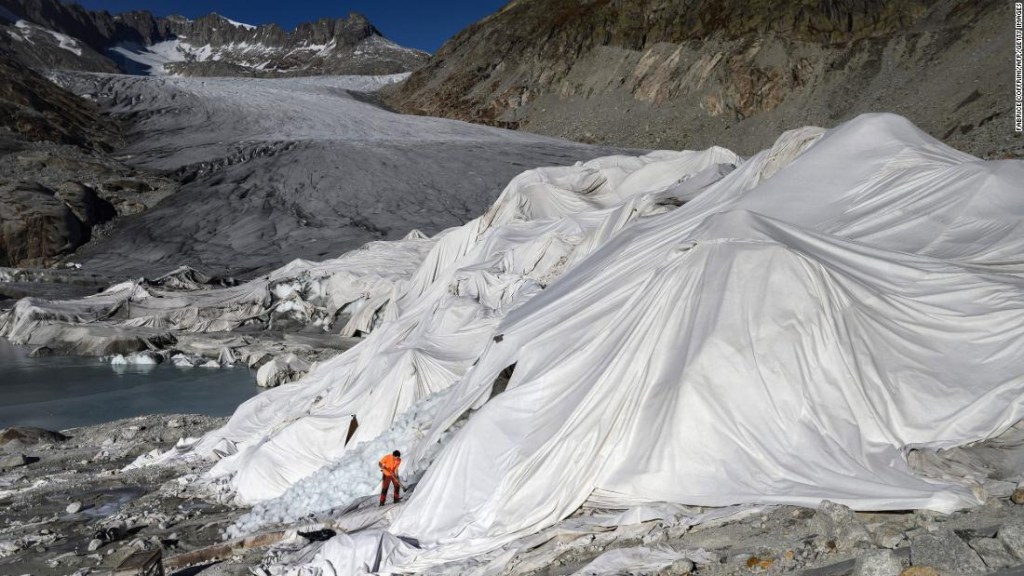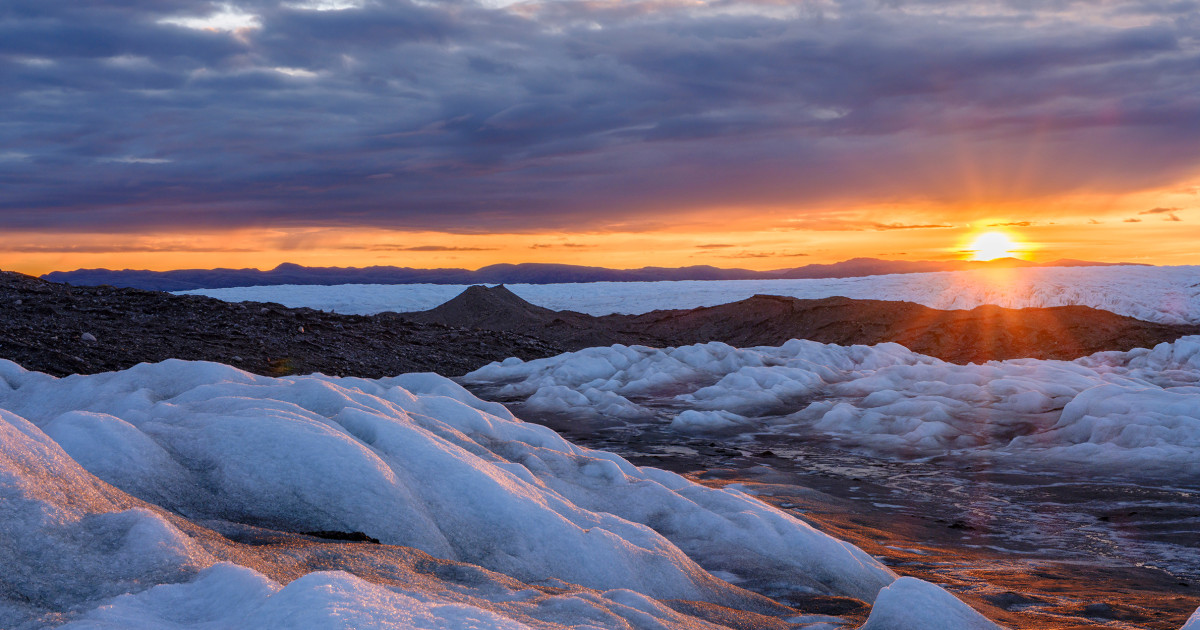The 5 places most affected by climate change 0:56
(CNN) --
Climate change is well on its way to transforming life on Earth as we know it, and unless global warming is drastically curbed, billions of people and other species will reach points where they can no longer they will be able to adapt to the new normal, according to an important report published this Monday.
The report, backed by the United Nations (UN) and based on years of research by hundreds of scientists, concludes that the impacts of man-made climate change are greater than previously thought.
The report's authors say these impacts are happening much faster and are more disruptive and widespread than scientists expected 20 years ago.
The authors point out the existence of enormous inequalities in the climate crisis, noting that those who contribute the least to the problem are the most affected, and warn of irreversible impacts if the world exceeds 1.5 degrees Celsius of global warming.
UN Secretary-General António Guterres called the report "an atlas of human suffering and a damning indictment of the failure of climate leadership," warning that "delay means death."
"The facts are undeniable. This abdication of leadership is criminal," Guterres said in a statement.
"The world's biggest polluters are guilty of burning down our only home."
advertising
Thousands left homeless and hungry this Christmas as the Philippines grapples with the reality of the climate crisis
He also said "current events" showed the world was too dependent on fossil fuels, calling them a "dead end", in an apparent reference to the Ukraine conflict and energy crisis.
These are the key points of the report:
A warming of more than 1.5 degrees could have irreversible consequences
Bleaching of coral reefs around French Polynesia in 2019.
Scientists have warned for decades that warming must be kept below 1.5 degrees Celsius above pre-industrial levels.
Monday's report, prepared by the UN's Intergovernmental Panel on Climate Change (IPCC), shows that if that limit is exceeded, some changes will be irreversible for hundreds, if not thousands, of years.
And some changes may be permanent, even if the planet cools again.
According to IPCC estimates, considered conservative, the world is already 1.1 degrees Celsius warmer than before industrialization.
We are now rapidly heading towards 1.5 degrees.
According to the report, with each extreme event, ecosystems are further pushed towards so-called tipping points, beyond which irreversible changes can occur.
With 2 degrees warming, for example, up to 18% of terrestrial species will be at high risk of extinction, according to the report.
With 4 degrees, 50% of the species will be threatened.
"With 1.5 degrees there are already many challenges for various systems that we know of," said Hans-Otto Pörtner, co-director of the report and a scientist at the Alfred Wegener Institute's Helmholtz Center for Polar and Marine Research.
"In the case of coral reefs, we have to say that in many places they are already beyond tipping points. They are in decline."
A man works in the Swiss Alps on the Rhone Glacier in October 2021, which is partially covered in insulating foam to prevent it from melting due to global warming.
The highly vulnerable ecosystems of the Arctic, mountains and coasts are most at risk of these changes, the authors say.
The melting of ice caps and glaciers will cause an accelerated rise in sea level, irreversible for centuries.
Forests, peatlands and permafrost - places where greenhouse gases are naturally stored - are at risk of being pushed into a situation where they emit those gases into the atmosphere, causing even more warming.
They reveal how birds adapt to climate change 0:52
We're running out of ways to adapt
"Adaptation" is about finding ways to live with change, such as building walls to prevent sea level rise or enforcing new building codes to ensure homes can withstand more extreme weather.
Scientists point out that some of our adaptations have mitigated the impact of the climate crisis so far, but they are not adequate in the long term.
Our adaptation options will be even more limited if we reach 1.5 degrees.
A flood defense wall under construction on the east side of Manhattan in New York City on December 11, 2021.
And while the natural world has adapted to climate change over millions of years, the pace of human-driven global warming is driving many of the planet's most critical systems - such as rainforests, coral reefs, coral and the Arctic - to the limit.
More extreme weather is not only affecting humans, it is causing massive plant and animal die-offs.
Population growth and development, which has not been carried out with long-term adaptation in mind, are also drawing people into danger.
As many as 3.6 billion people live in places that are already highly vulnerable to climate risks, some of which will rise beyond adaptive capacity once the planet reaches the 1.5 degree mark.
A large part of the world's resources, in particular international financing, is devoted to reducing greenhouse gas emissions, which is known as mitigation.
At the COP26 climate talks in Glasgow, Scotland last year, developing countries complained that the rich world was not helping to adequately finance adaptation in their countries.
"We've seen that the vast majority of climate finance goes to mitigation and not adaptation," said Adelle Thomas, author of the report and a climate scientist at the University of the Bahamas.
"So even though adaptation is happening, it's underfunded and it's not a high priority, which is pushing these limits."
Up to 3 billion people will suffer from "chronic water scarcity"
Residents fill water containers during a shortage in Nairobi, Kenya, in January.
About half of the world's population suffers severe water shortages each year, partly due to climate-related factors, according to the report.
Water will become even scarcer with higher global temperatures.
With 2 degrees of warming - which scientists predict the planet will reach by mid-century - up to 3 billion people worldwide will suffer from "chronic water scarcity," according to the report.
This figure increases to 4,000 million people with 4 degrees.
Water scarcity will put enormous pressure on food production and add to the world's already serious food security problems.
A water crisis is already brewing in the western United States.
The multi-year drought has depleted reservoirs and caused unprecedented water shortages in the region.
Lake Mead, the nation's largest reservoir, has fallen to record lows in recent months, threatening the water supply for tens of millions of people.
Dead almond trees lie in an open field after being removed by a farmer due to lack of water to irrigate them, in Huron, California, in July 2021. The authors say the drought has put a hard limit on the adaptation of almond farming .
Most of the Middle East is experiencing high levels of water stress, which is expected to worsen the warmer the Earth gets, raising questions about how long those parts of the region will remain habitable.
Vast swaths of Africa have also suffered from prolonged drought in recent years.
The report focuses on the interconnectedness between Earth's ecosystems and humans, including how the climate crisis is altering water resources.
"What we really wanted to show is that ecosystems and all sectors of human society and human well-being are critically dependent on water," Tabea Lissner, a scientist at Climate Analytics and one of the report's authors, told CNN.
"And it's not just the water resource itself that plays an important role in water security, but also in what form and in what quality we can access it, and really showing the number of different ways that climate change affects really to humans and ecosystems through various channels.
First on CNN: New FEMA Plan Prioritizes Climate Crisis After Trump Administration Deleted It
The least responsible people are the most affected
Flooding in the Sudanese capital of Khartoum on September 7, 2021.
The countries that emit the least greenhouse gases, mainly those in the Global South and island territories, tend to be the most affected by climate risks, according to the report.
"We live in an unequal world," Eric Chu, one of the report's authors and a scientist at the University of California, Davis, told CNN.
"Losses are unevenly distributed across communities, especially those that have historically been disadvantaged in decision-making, and now we're seeing some of that inequality manifest in the choices we make to adapt as well."
Camille Parmesan, an ecologist at the CNRS Ecology Station and one of the report's authors, said that as climate change worsens, more indigenous people will lose the land, water and biodiversity they depend on.
An aerial view of Ejit, in the Marshall Islands, increasingly overwhelmed by rising sea levels.
"There is increasing evidence that many indigenous communities that depend much more on natural systems for their food and livelihoods are not only the most exposed, because those natural systems are being severely impacted, but they are also the most vulnerable because are often in areas with high poverty or poor access to health care," Parmesan said.
As the climate crisis unfolds, more people will be forced to move, adding stress and vulnerability to other regions.
"When the land is not arable, the dependency on livelihoods that communities have on agriculture and food production, not only will income be lost, but that food security will be lost," said Vivek Shandas, professor of climate adaptation and urban policy at Portland State University, who was not involved in the report.
"That ability to survive each day will be lost. As humans, throughout history, we've moved from less livable places to more affordable and livable places."
We can still avoid the worst
Employees at Akfen Renewable Energy Group's Canakkale Wind Power Plant in Turkey perform a routine maintenance check on equipment on top of a wind turbine in December 2021.
While many regions of the developing world are unable to adapt due to lack of funding and capacity, the IPCC singles out North America as a region where misinformation and politicization are an obstacle.
This has led to a misunderstanding of the magnitude of the risk and has polarized the response to the crisis, ultimately "delaying urgent adaptation planning and implementation", say the report's authors.
In Europe, they point to a lack of political leadership and a low sense of urgency as some of the obstacles that need to be overcome.
But these are hurdles that can be overcome, and the authors say there is still a window of opportunity for meaningful action, though it is closing fast.
“There are opportunities to adapt from here to 1.5 [degrees],” in addition to drastically reducing heat-trapping fossil fuel emissions, Chu said.
"But as we go beyond 1.5, the window of opportunity becomes much more restricted and reduces effectiveness."
Watch climate change in real time: timelapse of a glacier that disappears in six weeks
Lissner called the report "an urgent call to action" for world leaders to move toward climate-resilient development: cutting emissions as much as possible while investing in adaptation to address the changes we already see. .
Decision-makers must also be intentional about helping the most disadvantaged communities and countries, so that no one is left behind in the process.
"It's important that this is also done in an inclusive or equitable way," said Lissner, "looking at how the most vulnerable regions can really be supported in adaptation."
CNN's Angela Dewan contributed to this report.
climate changeclimate crisis




/cloudfront-eu-central-1.images.arcpublishing.com/prisa/NVICYEXN5FGNNGINGZUKRWHQJU.JPG)




/cloudfront-eu-central-1.images.arcpublishing.com/prisa/2C5HI6YHNFHDLJSBNWHOIAS2AE.jpeg)




